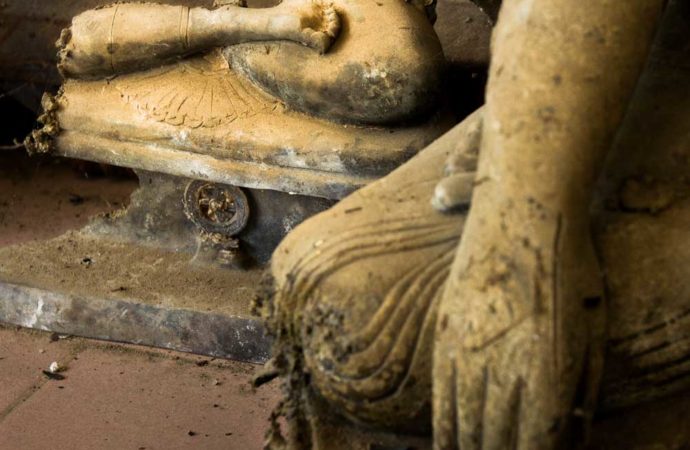A revaluation of our institutions is in order

Photo Credit: Rajib Dhar/Dhaka Tribune
Some houses and temples have again been burned. People have again been victimised. It’s not a very surprising routine, really; these things happen once in a while in our country.
I could blame it all on the usual suspects, but I won’t. I could play the pity card and pretend that I know the suffering of the Bangladeshi minorities inside and out, but I won’t do that either.
For one, I have never been a minority. I have never been treated as such.
So frankly, I don’t understand the “calling yourself a malaun” trend among some urban secular Bengali Muslims (yeah, the labels are intentional).
We’ve enjoyed the perks of being an ethnic and religious majority for so long, and now when one political leader uses the M word, all of a sudden we try to own it?
But as Bengali Muslims, we can’t own it. Our houses and temples weren’t burned.
We really can’t equate ourselves with the minorities here, when the treatment is so unabashedly unequal. The duty for all Bangladeshis now is to acknowledge these crises.
Instead, this sudden embrace of a label that’s not even imposed on us is a terrible patronisation.
It’s a sad attempt at diverting guilt by pretending to be helpless.
This solution lies, as I’ve said before, in a much needed debate on democratic norms and institutions.
How is this debate related to solving communalism?
The answer to that is complex, one which I haven’t figured out completely.
What I have realised is that the assimilative nature of Bengali nationalism as had been formulated in the 60s and 70s is at odds with its self-professed secular outlook.
This is because our ethnic identity is very intricately tied to our religious one, and so, our vision of secular nationalism is an assimilative process where for Hindu, Buddhist, or Christian lives to have value, they have to be assimilated into the Bengali Muslim identity.
This is visible in the slogan “Banglar Hindu, Banglar Bouddho, Banglar Christian, Banglar Musolman, amra shobai Bangalee.”
With all its graces, this slogan inevitably implies that Hindu, Buddhist, and Christian lives are worth something because they are equal to Muslim lives. That for everyone’s lives to carry value, they had to be forged into a national identity.
All cultural differences that are present due to spiritual differences will have to be put aside, or at least, downplayed.
The hypocrisy behind this slogan is that, despite its calls for a national identity, it lets us know that we belong to certain groups.
In fact, it never lets us forget it. And whenever a crisis arises, we see for ourselves that, despite our glorified national identity, the different sects of the population get treated differently based on their ethnic and religious identity.
This fuels a vicious brand of ethno-centrism among all segments of the population. From there, communalism is only a short distance away; though only the majority has the resources to walk that path.
I won’t talk about why and how the minorities feel marginalised in this country: The fire in Brahmanbaria hasn’t died yet
As for Bangladeshi secularism, my feelings towards it are similar to that of Ashis Nandy on Indian secularism.
And on the question of national ideology, I somewhat agree with Pervez Hoodbhoy; it’s not mandatory for a nation-state to have one.
There are countries out there that don’t promote a national identity and are getting along just fine.
Why should Bangladesh make the same mistake India and Pakistan ended up making, by trying to amalgamate all its citizens into a monolithic image?
In ardent contrast to the one-nation and two-nation theory, Bangladesh could have promoted a much healthier alternative of multi-culturalism.
It still can.
But before that, we have to examine why a considerable portion of the majority in this country feels marginalised.
In recent times, there have been a few reports of authority targeting people who appear to be conservative Muslims. I care for my own life enough to speak only about a hypothetical scenario where a few law enforcement officials “may” have been running extortion racketeers by arresting innocent people and threatening to frame them. While it’s not near the scale of how minorities get targeted, it’s still notable.
This is, however, a limited answer.
The greater picture is that, to a considerable portion of Bengali Muslims, the assimilative nature of Bengali nationalism expresses itself in a different way: They end up feeling that their religious identity has to be discarded, or at least downplayed, for the sake of a national identity, and consequently, they feel marginalised.
Those in the political right are quick to make advantage of this, and the left-leaning intelligentsia often makes it worse by labelling each and every conservative as a Razakar/jongi (face it, how many of our TV and movie villains happen to wear a tupi and sport a beard?).
While I can’t in good faith deny the existence of a self-righteous puritanical religious right in this country, this sort of demeaning characterisation makes it easier for that right to prove that secularism is merely a façade for anti-religious agenda.
I won’t talk about why and how the minorities feel marginalised in this country: The fire in Brahmanbaria hasn’t died yet. The one in Ramu is only four years old. And I won’t cry either, or say that my sympathies go out for those people.
Neither of these things happens to be affirmative action. If the Bangladeshi political culture continues on its un-democratic path, nobody will really be safe in this country, though some will be at a lesser risk than others.
It is only democratic institutions that can subdue communalism. A revaluation of the principles underlying our constitution and the entire political process has become almost mandatory.
(Fardin Hasin is a freelance writer).
Republished with permission from Dhaka Tribune.